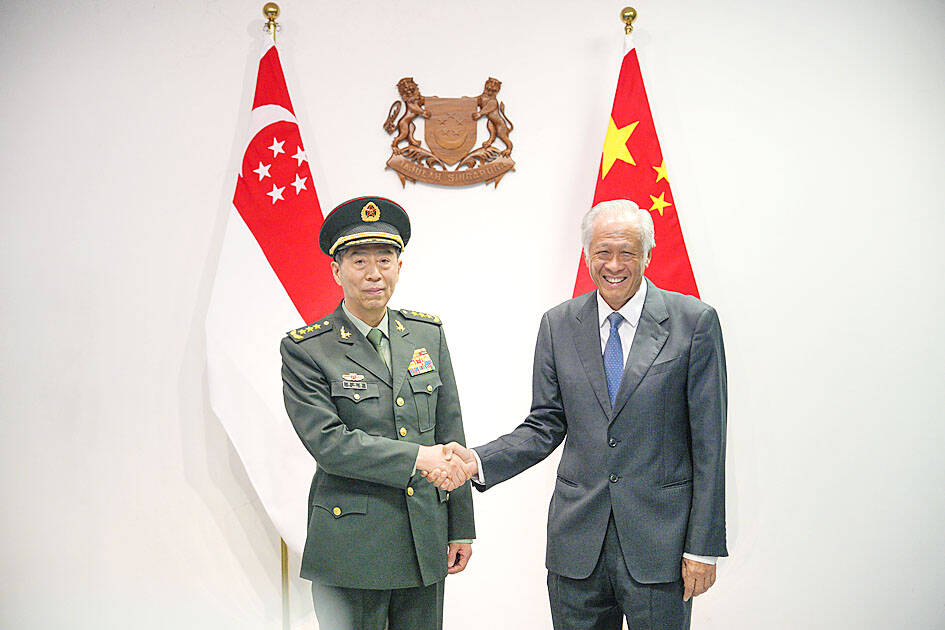China and Singapore yesterday laid the groundwork for a hotline between the two states that would establish a high-level communications link between Beijing and a close US partner in Asia at a time when Chinese tensions with Washington are high and dialogue has stalled.
Chinese Minister of National Defense Li Shangfu (李尚福), a general in the Chinese People’s Liberation Army who was named minister in March, signed a memorandum of understanding with Singaporean Minister for Defence Ng Eng Hen (黃永宏) to work toward establishing a secure telephone link “for high-level communications between our defense leaders,” a statement released by Singapore said.
“Such high-level open lines of communications are important for strengthening mutual understanding and trust,” the statement said, without giving a timeline for when it would be established.

Photo: AP
Li is on his first visit to Singapore as defense minister, and is broadly discussing global and regional security issues with a range of officials.
The city-state said both governments’ defense establishments “interact regularly through bilateral and multilateral exercises,” and that his visit underscores “long-standing, warm and friendly” relations.
At the same time, Singapore is a close military and economic partner of the US, and the agreement to establish the direct phone link came as communications between Washington and Beijing are strained.
Li also established a defense hotline with Japan in March to improve communication and help avoid accidental encounters in the tense region.
While in Singapore, Li is expected to address a meeting of defense officials, diplomats and country leaders on Sunday, but declined a request from Washington to meet on the sidelines with US Secretary of Defense Lloyd Austin, who is to give a speech at the Shangri-La Dialogue security conference on Saturday.
Among many issues, China has been irritated by US support for Taiwan, the shooting down of what the US called a Chinese spy balloon and sanctions directly targeting Li.
Those sanctions are related to Washington’s broad package of measures against Russia, but predate its invasion of Ukraine and were imposed in 2018 over Li’s involvement in China’s purchase of combat aircraft and anti-aircraft missiles from Moscow.
The sanctions, which broadly prevent Li from doing business in the US, do not prevent him from holding official talks, the US has said.
Earlier this week, Chinese Ministry of National Defense spokesman Tan Kefei (譚克非) said Austin’s offer of talks in Singapore had been rejected because the US “disregards China’s concerns and creates artificial obstacles.”

‘CHARM OFFENSIVE’: Beijing has been sending senior Chinese officials to Okinawa as part of efforts to influence public opinion against the US, the ‘Telegraph’ reported Beijing is believed to be sowing divisions in Japan’s Okinawa Prefecture to better facilitate an invasion of Taiwan, British newspaper the Telegraph reported on Saturday. Less than 750km from Taiwan, Okinawa hosts nearly 30,000 US troops who would likely “play a pivotal role should Beijing order the invasion of Taiwan,” it wrote. To prevent US intervention in an invasion, China is carrying out a “silent invasion” of Okinawa by stoking the flames of discontent among locals toward the US presence in the prefecture, it said. Beijing is also allegedly funding separatists in the region, including Chosuke Yara, the head of the Ryukyu Independence

UNITED: The premier said Trump’s tariff comments provided a great opportunity for the private and public sectors to come together to maintain the nation’s chip advantage The government is considering ways to assist the nation’s semiconductor industry or hosting collaborative projects with the private sector after US President Donald Trump threatened to impose a 100 percent tariff on chips exported to the US, Premier Cho Jung-tai (卓榮泰) said yesterday. Trump on Monday told Republican members of the US Congress about plans to impose sweeping tariffs on semiconductors, steel, aluminum, copper and pharmaceuticals “in the very near future.” “It’s time for the United States to return to the system that made us richer and more powerful than ever before,” Trump said at the Republican Issues Conference in Miami, Florida. “They

GOLDEN OPPORTUNITY: Taiwan must capitalize on the shock waves DeepSeek has sent through US markets to show it is a tech partner of Washington, a researcher said China’s reported breakthrough in artificial intelligence (AI) would prompt the US to seek a stronger alliance with Taiwan and Japan to secure its technological superiority, a Taiwanese researcher said yesterday. The launch of low-cost AI model DeepSeek (深度求索) on Monday sent US tech stocks tumbling, with chipmaker Nvidia Corp losing 16 percent of its value and the NASDAQ falling 612.46 points, or 3.07 percent, to close at 19,341.84 points. On the same day, the Philadelphia Stock Exchange Semiconductor Sector index dropped 488.7 points, or 9.15 percent, to close at 4,853.24 points. The launch of the Chinese chatbot proves that a competitor can

‘VERY SHALLOW’: The center of Saturday’s quake in Tainan’s Dongshan District hit at a depth of 7.7km, while yesterday’s in Nansai was at a depth of 8.1km, the CWA said Two magnitude 5.7 earthquakes that struck on Saturday night and yesterday morning were aftershocks triggered by a magnitude 6.4 quake on Tuesday last week, a seismologist said, adding that the epicenters of the aftershocks are moving westward. Saturday and yesterday’s earthquakes occurred as people were preparing for the Lunar New Year holiday this week. As of 10am yesterday, the Central Weather Administration (CWA) recorded 110 aftershocks from last week’s main earthquake, including six magnitude 5 to 6 quakes and 32 magnitude 4 to 5 tremors. Seventy-one of the earthquakes were smaller than magnitude 4. Thirty-one of the aftershocks were felt nationwide, while 79